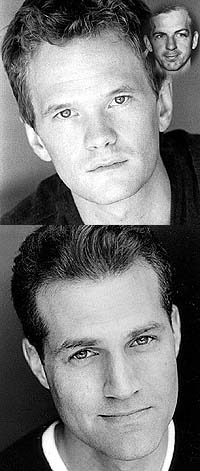
*
Learn more about the benefit reunion concert of the Stephen Sondheim-John Weidman musical, which tells the stories of the men and women who killed (or tried to kill) presidents of the United States. The Roundabout revival played Studio 54 in 2004, and returns there for one night only.
The staging is again directed by Joe Mantello, who won a Tony for his work. In addition to winning Tonys for Michael Cerveris (Best Actor in a Musical, for playing John Wilkes Booth), Best Musical Revival, Best Orchestrations (Michael Starobin) and Lighting Design (Jules Fisher and Peggy Eisenhauer), Denis O'Hare was nominated as Featured Actor in a Musical for playing Charles Guiteau, killer of President Garfield.
A version of this piece appeared in 2004, during the Broadway run of Assassins. We thought it deserved a second look.
| |
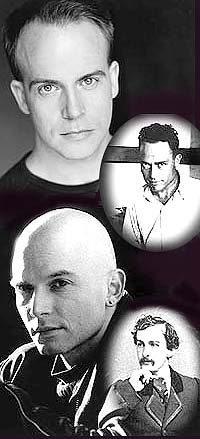 |
|
| Jeffrey Kuhn (inset Zangara) and Michael Cerveris (Booth) |
(aka Joseph Zangara)
Born: September 7, 1900, in Ferruzzano, Italy
Before he was an assassin: Bricklayer
Other jobs: Menial laborer
Assassination Attempt: President-elect Franklin D. Roosevelt on February 15, 1933, at Bayfront Park in Miami, Florida
Why he became an assassin: Riddled with stomach pains he blamed on his father, Zangara previously plotted to kill King Victor Emmanuel III because the Italian government would not help him punish his father. After emigrating to the United States, he underwent an appendectomy (which did not alleviate his suffering). The onset of The Great Depression worsened his condition. Zangara decided to kill President Herbert Hoover, but changed targets after Roosevelt won the election.
Died: March 20, 1933, in the electric chair at the Florida State Penitentiary. He was sentenced to death in the electric chair after the death of Mayor of Chicago, Anton Cermak — who was hit by one of the five bullets Zangara fired in his failed attempt on FDR. At sentencing, he yelled to the judge, "You give me electric chair. I no afraid of that chair! You one of capitalists. You is crook man too. Put me in electric chair. I no care!"
Last Words: "Lousy capitalists! No picture! Capitalists! No one here to take my picture. All capitalists lousy bunch of crooks. Go ahead. Push the button!"
Born: October 10, 1969, in St. Clements, Ontario
Before he was in Assassins: Broadway: Ragtime; Other: Off-Broadway in Floyd Collins, original Canadian company of The Lion King
Other jobs: None, left drama school to join Stratford Festival company
Why he became an actor: "I think of myself as being, in many ways, a shy person. A lot of people would find that difficult to believe, but I always felt like a very shy kid and I always felt timid about expressing who I was and what I had to say. So, I think it was intoxicating and powerful to assume the mantle of somebody else and feel like I was given license to become something else.
On research for playing Zangara:
"I've had the good fortune that there's been a book published relatively recently about him, which gives a lot of information that previously would have been difficult to look up. So, that's been immensely helpful so far. And actually, in the process of writing his book, they discovered some of his diaries that he kept in prison. So that's interesting and gives me a little bit of insight to how he thought and how he expressed himself.
Probably the most surprising thing to me is that so many people said he was kind-hearted and sort of jovial and almost light-hearted. Which, of course, is juxtaposed with these moments of extreme rage and anger. I didn't expect that. I expected that he was probably a darker, moodier soul all around. But many people said that he was very articulate and calm and verbose and genial. And then he could turn if the topic turned to something political."
On being a political person:
"I think one of the things that attracts me to [Zangara's] story and attracts me to Assassins, in particular, is that, although [I had] a completely different experience, I'm an immigrant to the United States myself. So, I feel that my views as an person observing a political system of which I can't be an active participant gives me an individual, outsider viewpoint. That resonates with me very much when I think of him feeling very much on the outside, choosing to live within a structure that he felt really didn't embrace him, or that he had no place in. Of course, I don't feel the same way he did. And I couldn't be more anti-death penalty."
Born: May 10, 1838, near Bel Air, Maryland
Brother: Actor Edwin Booth (for whom Broadway's Booth Theatre is named)
Before he was an assassin: Actor
Other jobs: Farm hand, Oil investor
Assassinated: President Abraham Lincoln on April 14, 1865, at Ford's Theatre in Washington, D.C.
Why he became an assassin: A diehard advocate of the South's cause, Booth previously plotted a failed attempt to kidnap Lincoln in exchange for the release of Confederate prisoners. Weeks later, General Robert E. Lee's surrender to the Union coupled with Lincoln's granting voting rights to blacks drove Booth to formulate another plan with conspirators, this time to kill Lincoln, Vice President Andrew Johnson and Secretary of State William Seward. Only Booth's part of the mission was completed, with the actor screaming "Sic Semper Tyrannis" ("Thus Always to Tyrants" - Virginia's state motto).
Died: April 26, 1865, on the porch of Richard Garrett's house near Port Royal, Virginia, after being discovered at his hideout. After several hours of trying to draw him out alive, soldiers set fire to the barn where he was. But a sergeant, seeing him through a crack, took aim and shot him in the neck. He died hours later after claiming he did it "for his country."
Last Words: [Looking at his hands] "Useless, useless."
Born: November 6, 1960, in Bethesda, Maryland (grew up in Huntington, West Virginia)
Brother: Actor Todd Cerveris (Broadway's Twentieth Century)
Before he was in Assassins: Broadway: The Who's Tommy, Titanic; Off-Broadway: Hedwig and the Angry Inch, Fifth of July, Wintertime
Other jobs: Waiter, FAO Schwarz Window Display, Collator.
"I waited tables in any number of New York restaurants and I did window display at Christmas time at FAO Schwarz once. And the most bizarre job I had was — I guess this was before collating Xerox machines were every place — I worked for a week with eight other people walking around a table stacked with piles, each pile was a different page of this document. We just walked around in circles for eight hours a day... after a while you start to get dizzy and disoriented. But it paid well and, of course, everybody else were actors, too."
Why he became an actor: "There are a lot of good comic answers, you know: lack of any real ability to do anything; seemed more appealing than getting a real job. But, I think the truth of it is as I was growing up — all through school, through high school, through college — I explored everything else. I kind of resisted the idea that I would be an actor even though I had started doing things at a young age at Webster Groves College in St. Louis, just as the kid in the university productions of you know Caucasian Chalk Circle or whatever. When you start out with Brecht, what hope do you have?
It just became clear over time as much as I was fascinated by and interested in other things, and I think quite possibly could have been happy doing any one of them, when I walked into a theatre and when I went on stage, I really felt a sense of place and sense of home there. And that seemed to be a place that I belong.The nice thing now is that I have my music stuff to do in between times, so I have something that I'm really excited by and creatively satisfied by when I'm not actually working."
On research for playing Booth:
"My brother, a friend and my girlfriend gave me copies of Booth's book of letters called 'Right or Wrong, God Judge Me' and several other people have given me other books and research materials. My brother actually has written a one-person show that he's been developing for a few years about John Wilkes and [his brother] Edwin Booth, so he has a great deal of material amassed for that.
I think the most interesting thing I've discovered so far was that Lincoln was an extremely controversial and largely unpopular president at that particular moment in history. I just sort of assumed he always kind of had the reputation and the position that he has now, but I've learned that that wasn't at all true. It makes it much easier to believe that as distorted as his reasons were, [Booth] wasn't crazy. He wasn't insane. He saw himself as a patriot. And as we see these days, a lot of violent and questionable things are done in the name of patriotism. It makes him much more of a complex person than just an evil lunatic.
On being a political person:
"I would say that I am. I think I'm not as educated as I feel I ought to be and would like to be, but I think I've grown increasingly political over the last five years or so. I'm constantly battling with feeling apathetic in the face of disillusionment with the political system and the way things seem to be going lately. At times, you just want to turn off the TV completely and just ignore it all which, of course, is not the best response. I found myself getting very involved in the peace marches and things last February and took a lot of hope and heart from those events.
On the parallels between the Booth and Cerveris acting brothers:
"Hopefully it won't end as badly as it did for those two."
| |
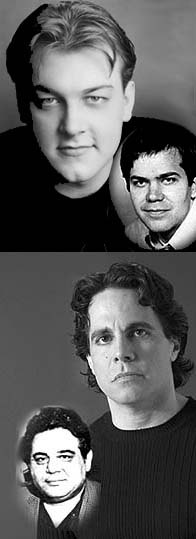 |
|
| Alexander Gemignani (inset Hinckley) and Mario Cantone (Byck) |
(aka John Warnock Hinckley, Jr.)
Born: May 29, 1955, in Ardmore, Oklahoma
Father: John W. Hinckley, Sr., Vanderbilt Energy Corporation Chairman and President
Before he was an assassin: Songwriter
Other jobs: Busboy, College Student
Assassination Attempt: President Ronald Reagan on March 30, 1981, outside the Washington Hilton in Washington, D.C.
Why he became an assassin: An increasingly reclusive college dropout, Hinckley moved to Hollywood to pursue a career as a songwriter. He became obsessed with Martin Scorcese's film "Taxi Driver," identifying with the protagonist's attempts to save a young prostitute played by Jodie Foster. After failed attempts at courting the actress, he decided an assassination would impress her. After stalking Jimmy Carter, the attempt was made on his successor Reagan.
Found: Not guilty by reason of insanity on June 21, 1982, and sent to live in St. Elizabeth's Mental Hospital in Washington, D.C. Famous Words: [Throwing a pen, during his trial, at a videotaped testimony in which Jodie Foster denied any relationship with him] "I'll get you, Foster!"
Born: July 3, 1979, in Manhattan, New York (grew up in Tenafly, New Jersey)
Father: Paul Gemignani, Musical Director of Assassins
Before he was in Assassins: Off-Broadway: Avenue Q; Other: The Trapped Family Singers (FringeNYC), world premiere of Marty
Other jobs: UPS Store, TCBY, Waiter at TGI Friday's
Why he became an actor: "I went to college to be a trumpet major and it was great. I had a fantastic trumpet teacher and I did very well. Then after the first semester, I [began] losing my love for playing my horn and I didn't want to do that. It was more about [how] I couldn't see myself in a pit, I couldn't see myself doing that. I always loved to do theatre and I did it in high school and I guess I can kinda sing, so I thought 'I'll audition for the department.' Well, it turns out I was at a great department and didn't know it. I loved the school so much and had such a great freshman year that I didn't want to leave."
On his casting for Assassins:
"[My school] had just done the show my senior year and I was called back for Byck. The teacher and I have a running gag about it, 'I'm going to go down in history as the guy who didn't cast you in Assassins.' I did my senior showcase after graduating. A guy who worked for [casting agent] Jim Carnahan came up to me after and said 'Hey, I'd love for you to come in for John Hinckley on Monday.' I said 'Okay' and went in. My dad was in the room. He actually was a little too nervous to handle it, so he got up and left the room for my first audition. I thought, 'That was fun, I got to audition for a Broadway show right out of college.' Then, the next day I got a call that said 'Come back tomorrow.' And it was very surprising, but great."
On being a political person:
"I have nothing but the utmost respect for people who follow politics and make a stand on an issue. If there's something I feel very strongly about, sure, but I've never been a very political person."
(aka Samuel Joseph Byck)
Born: 1930
Before he was an assassin: Salesman
Other jobs: Army Soldier
Next featured as a character in: "The Assassination of Richard Nixon" film starring Sean Penn
Assassination attempt: President Richard M. Nixon on February 22, 1974, at Baltimore-Washington International Airport
Why he became an assassin: In recorded tapes he sent to celebrities, including West Side Story composer Leonard Bernstein, Byck blamed the government for his woes and revealed his plan to hijack a commercial plane and crash it into the White House. Recently divorced, unemployed and turning 44, his plan "Pandora's Box" went into effect as he entered the airport with a gun and gasoline bomb, forced his way through a security checkpoint by killing a guard and made it onto an airplane headed to Atlanta.
Died: February 22, 1974, onboard Delta Flight 523. After being shot twice by police outside the still-parked plane, Byck turned his gun on himself.
Famous Words: [Protesting in a Santa Claus suit after a previous failed attempt to picket without a permit] "I want to see if they have the guts to arrest Santa Claus."
Born: December 9, 1959, in Boston, Massachusetts (grew up in Stoneham, MA)
Before he was in Assassins: Broadway: The Violet Hour, Love! Valour! Compassion!; Other: The Crumple Zone, "Sex and the City"
Other jobs: Jewelry Salesman, Stand-up Comedian
Next featured in: Laugh Whore, slated for Broadway this fall
Why he became an actor: "It was the only thing I knew how to do. I was short and Italian and odd. That's why I got into stand-up [comedy] cause I thought if I'm just an actor, I'm screwed. And it only took me 90 years to get anyplace and I'm still only semi-famous."
On his casting for Assassins:
"I called Joe [Mantello, his director for Assassins and Love! Valour! Compassion!] and said 'I never say to you: "You're doing this play, I wanna do it."' He goes 'What? You want to be in Assassins? I already cast you.' I'm like 'Wha...? What [role] is it?' And I'm thinking Guiteau because it's the flamboyant role and everybody thought that. And he said 'No, Sam Byck.' And it was a stroke because when I did it at the workshop, [original Assassins cast member] Victor Garber came up to me and said 'You're the only person who could stop a Sondheim show with a monologue and not a song.' I saw it three times Off-Broadway and I liked the part. I just didn't see myself in it."
On most interesting discovery in research for playing Byck:
"He hugged this girl before he went off to the airport. It seemed like it was just a very saddened moment for him; an innocent, sad moment that was pure for him."
On being a political person:
"No, I'm really not. I think the older I get, the more I'm aware of it and the more I pay attention to it. I don't talk about politics too much in my act [either], I have a little bit in my standup, but I'd rather rip apart Nicole Kidman or the Hilton sisters."
On whether he'll be putting on weight for the role:
"No. There will be no weight put on, I am not Marlon Brando or Robert De Niro. I'm in a schlumpy Santa Claus outfit, so I'll look slobby but underneath there will be a fine-ass body with six-pack abs." [Laughs.]
| |
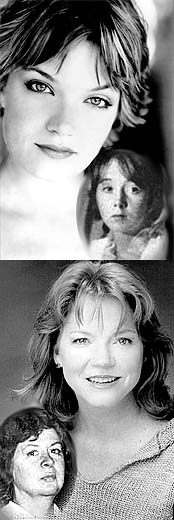 |
|
| Mary Catherine Garrison (inset Fromme) and Becky Ann Baker (Moore) |
(aka Squeaky, Red, Lynette Alice Fromme)
Born: Oct. 22, 1949 in Santa Monica, California
Before she was an assassin: Unofficial Manson "Family" Leader (after his arrest)
Other jobs: Westchester Lariats performer
Assassination Attempt: President Gerald Ford on September 5, 1975, outside the Senator Hotel in Sacramento, California
Why she became an assassin: Kicked out by her father, Fromme met Charles Manson at Venice Beach and became one of his followers. Still in contact with Manson after his conviction and. trying to gain attention for their environmental concerns, Fromme pointed a gun — loaded but with no bullet in the firing chamber — at Ford from two feet away.
Found: Guilty of attempted assassination and sentenced to life in prison. Famous Words: [As she pointed the gun on Ford] "The country is in a mess. This man is not your president!"
Born: December 19, 1973 in Clarksdale, Mississippi (grew up in New Orleans, Louisiana)
Before she was in Assassins: Broadway: The Man Who Came to Dinner; Off-Broadway: Debbie Does Dallas, Crimes of the Heart
Other jobs: Waitress, Mental Hospital File Clerk
"I was a waitress at a Chinese restaurant which I think was owned by gangsters. I was the only waitress."
Why she became an actor: "I was living in New Orleans and there was a creative arts high school called NOCCA (New Orleans Center for Creative Arts) and I thought it was going to be like Fame where people are just dancing. I had to go there. I actually got my minor in art. I assumed I would go into art. I wrote but I didn't really enjoy writing that much. I didn't enjoy dancing that much, I didn't sing or play an instrument, so that left acting. So I just thought 'Okay, yeah, I'll just try that.' And I never looked back, never did anything else."
On her casting for Assassins:
"Honestly, I have what I can only describe as a phobia, I'm so deeply afraid of singing in front of people. Actually, what happened was they hired Jennifer Laura Thompson; it was between the two of us and we had like this audition showdown. It was like two guys and two girls and Alex [Gemignani] and Jennifer got it. Then Urinetown went to Broadway and she stayed with that show. The experience was so daunting because everybody was such a great singer."
On research for playing Fromme:
"She's just so passionate about her beliefs and why she wants to do what she wants to do. It's interesting to play someone whose that passionate about something that's so off-center. I've been reading up a lot on her life, trying to get both sides of the story."
On being a political person:
"No, [I'm] not at all. I hate to admit it, but it just doesn't register with me. I can't dissect the language. I just tend to get a feeling for someone. I know that feeling is probably wrong because politicians are actors. What do they say? 'D.C. is Hollywood for ugly people' They're still performers."
(aka Sara Jane Kahn, Sally)
Born: 1930 in Charleston, West Virginia
Married: Five times
Before she was an assassin: Accountant
Other jobs: FBI Informant, Women's Army Corp, Nursing School Student
Assassination Attempt: President Gerald Ford on September 22, 1975, outside the St. Francis Hotel in San Francisco, California
Why she became an assassin: Leaving her job in her forties, Moore turned to revolutionary political groups. She was then hired as an informer by the FBI to gather information on the Patty Hearst kidnappers. When her FBI ties became known, Moore took action to split herself from the organization and to shake up the political system.
Found: Guilty of attempted assassination and sentenced to life in prison.
Famous Words: "I didn’t want to kill anybody, but there comes a point when the only way you can make a statement is to pick up a gun."
Born: February 17 in Fort Knox, Kentucky (grew up in various cities)
Married: To actor Dylan Baker
Before she was in Assassins: Broadway: Titanic, The Best Little Whorehouse in Texas; Off-Broadway: June Moon, Shanghai Moon.
Other jobs: Bartender
"In summer stock, I learned how to bartend because we all had to have these little jobs at the theatre. And so when I got here, I had a couple of very short-lived bartending jobs."
Why she became an actor: "I was one of those kids. I grew up in army bases, my father was a military man, and we moved around so much and were so rootless. You find in this business that there are a lot of people who had these roaming nomad backgrounds that go into the arts because you don't really have one job. It's suited in that you're constantly changing jobs and you don't necessarily know the next destination or what it holds for you. I got to watch a lot of smalltown community theatre and it was always a very romantic idea to me. I always thought I was going to be either an astronaut, an archaeologist or an actor. They all started with A's."
On her casting for Assassins:
"Joe [Mantello] asked me to do the workshop of it for Roundabout and I had just come off a season of a television show called 'Freaks and Geeks.' And I think that's how he thought of it, you know that kind of typical mid-Western mom that no one expects to do anything unusual."
On research for playing Moore:
"It's not as easy to find stuff on Sara Jane Moore as it is on, say, "Squeaky" Fromme. It think [Fromme] captured the imagination of people who like to write a little bit more. This is a woman who had five husbands, and four different children by different husbands and had about as many different careers as well. One of the most interesting things about her is her inability to commit to one thing. I started getting this idea that it's a woman who likes to reinvent herself a lot. I won't equate her to Madonna [laughs], but it's this woman who really likes to project herself onto different scenes."
On being a political person:
"I am. Yes, my husband and I both are watching all the [election coverage] pretty closely. And yes, I find seeing American history through the eyes of a villain is really fascinating to me."
| |
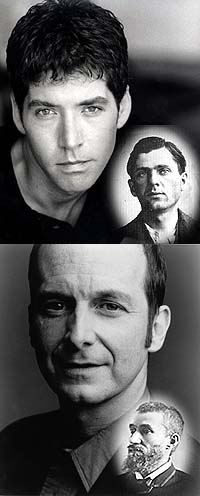 |
|
| James Barbour (inset Czolgosz) and Denis O'Hare (Guiteau) |
Character:

